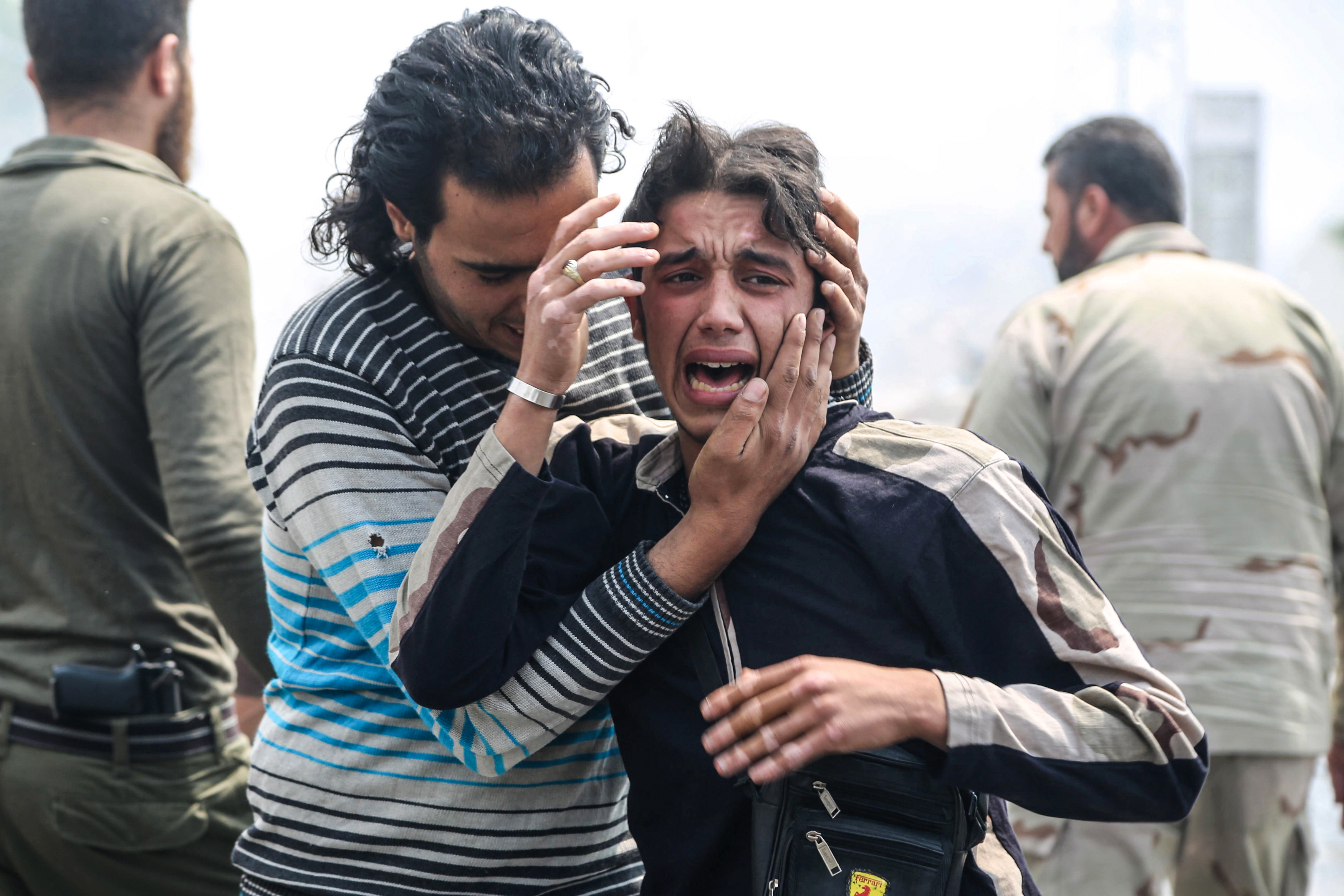How Obama made Syria's civil war much, much worse
Reflections on the fall of Aleppo, the West's culpability, and the ease of our collective guilt


Aleppo has fallen. And much of the West is awash in a considerable amount of guilt over the Syrian city's fate.
The Eiffel Tower was dark yesterday in honor of the victims of Bashar al-Assad's regime in Aleppo. In Britain's House of Commons, ministers grandly accused themselves of their own inaction. George Osborne, a conservative MP, said that there was "some hope for what might come out from this terrible tragedy in Syria, which is that we are beginning to learn the price of not intervening."
The horror in Aleppo is easy to mourn, because the West is now so thoroughly not in a position to do anything to halt it, or to end the regime that inflicts it. Watchers in the West no longer have to consider the fact that preventing the horrifying situation in Aleppo would have meant creating many more horrifying scenes in Damascus with our own bombs and artillery, as the West fought a hugely costly war with the Syrian regime.
The Week
Escape your echo chamber. Get the facts behind the news, plus analysis from multiple perspectives.

Sign up for The Week's Free Newsletters
From our morning news briefing to a weekly Good News Newsletter, get the best of The Week delivered directly to your inbox.
From our morning news briefing to a weekly Good News Newsletter, get the best of The Week delivered directly to your inbox.
Decrying Aleppo's fall is a freebie. We don't have to consider who would have inherited a Western victory over Assad. As of two weeks ago, perhaps 8,000 to 10,000 rebel fighters were holed up under the constant weeks-long shelling of Aleppo. The majority of them were affiliated with al Qaeda's Syria branches. Aleppo has its share of civilians who are sympathetic to the rebels and mortally terrified and imperiled by Assad's regime. But those who escaped Aleppo earlier this year say that many other civilians are kept there as human shields and propaganda for the al Qaeda fighters who held the city.
The final siege of Aleppo is almost a shocking replay of the 1982 Hama massacre, committed by Hafez al-Assad, in which the Syrian militarily routed the opposition led by the Syrian branch of the Muslim Brotherhood. Now, as then, Sunni Islamist forces were crushed to secure the long term survival of the Assad dynasty.
Osborne and interventionists in the U.S. should not learn the wrong lesson from Aleppo's fall. There was never a good plan from the West. The Spectator's Freddy Gray described the interventionists' 2013 thinking, and it is not flattering: "Bomb first, think later seemed to be the strategy, just as it was in Libya — and look how well that turned out." Intervention in Syria was fantastically unpopular in Britain and America. That's why the House of Commons, and later the U.S. Congress, ended up voting against it.
The Obama administration, although it backed away from its half-hearted push for larger intervention, still carried on covert support of the rebels. The CIA and Defense Department armed different groups (who sometimes shot at each other). The Free Syrian Army, the so-called "moderate" rebels on whom so many hopes were pinned, kept disintegrating. Even as the U.S. tried to rebrand it as the "New Syrian Force," its fighters often defected to al Qaeda, or even ISIS. If they didn't defect, they would sometimes just lose their new weapons to these more established radical Sunni brands. The United States was allied with the allies of al Qaeda in Syria, and carried out its covert missions under the 2001 AUMF that authorized the U.S. to fight al Qaeda. It's dizzying.
A free daily email with the biggest news stories of the day – and the best features from TheWeek.com
Along the way, the U.S.'s half-hearted intervention possibly created the worst of all worlds. It encouraged people to invest themselves in a doomed fight much longer than was necessary. It caused rebels to place their hopes in a more broad intervention that was never coming. And it lengthened one of the most disastrous civil wars of the modern era, one whose aftershocks and refugee flows have brought terror to Europe and helped empower a resurgent nationalism that is shaking the political and economic foundations of the European Union.
Lastly, the U.S. having involved itself just enough to look like a loser, ceded initiative to its chief geopolitical rival, Russia. Not only did Obama help make Syria one of his own "losses," he paved the way to make it look like a Russian win over the United States and radical Sunni Islam. It's a disaster.
But if the U.S. really wanted to overthrow Assad, the likeliest outcome was the disaster that has afflicted Syria and, to a lesser degree, Iraq: multiple groups claiming the right to govern, and the flourishing of ISIS in the midst of the disorder. That's the choice Obama backed into, either giving Russia a geopolitical boost, or becoming an agent of chaos again.
On top of the horrors in Aleppo's fall is the dreadful reality that even this may not bring about the end of the war. Positions in Syria that had been recaptured by the government forces and Russia have been abandoned to the control of ISIS. That ISIS recaptured Palmyra was a particularly significant propaganda coup as the Russians had flown in a symphony orchestra to play in its picaresque ruins in celebration of its liberation last year. But taking Aleppo means that the Assad regime has control of the major cities of his nation again, if not the periphery.
The horrors in Aleppo are all too real. Honoring the memory of the dead in Syria will require much more serious reflection by our leadership class than what we've seen this week. Turning the Eiffel Tower into a memorial for al Qaeda's dead, and mourning our lost chance at a wider war that had no plausible happy ending, is just another grotesquerie in a long parade of disasters in this region.
Michael Brendan Dougherty is senior correspondent at TheWeek.com. He is the founder and editor of The Slurve, a newsletter about baseball. His work has appeared in The New York Times Magazine, ESPN Magazine, Slate and The American Conservative.
-
 The ultimate films of 2025 by genre
The ultimate films of 2025 by genreThe Week Recommends From comedies to thrillers, documentaries to animations, 2025 featured some unforgettable film moments
-
 Political cartoons for January 3
Political cartoons for January 3Cartoons Saturday's political cartoons include citizen journalists, self-reflective AI, and Donald Trump's transparency
-
 Into the Woods: a ‘hypnotic’ production
Into the Woods: a ‘hypnotic’ productionThe Week Recommends Jordan Fein’s revival of the much-loved Stephen Sondheim musical is ‘sharp, propulsive and often very funny’
-
 How Bulgaria’s government fell amid mass protests
How Bulgaria’s government fell amid mass protestsThe Explainer The country’s prime minister resigned as part of the fallout
-
 Femicide: Italy’s newest crime
Femicide: Italy’s newest crimeThe Explainer Landmark law to criminalise murder of a woman as an ‘act of hatred’ or ‘subjugation’ but critics say Italy is still deeply patriarchal
-
 Brazil’s Bolsonaro behind bars after appeals run out
Brazil’s Bolsonaro behind bars after appeals run outSpeed Read He will serve 27 years in prison
-
 Americans traveling abroad face renewed criticism in the Trump era
Americans traveling abroad face renewed criticism in the Trump eraThe Explainer Some of Trump’s behavior has Americans being questioned
-
 Nigeria confused by Trump invasion threat
Nigeria confused by Trump invasion threatSpeed Read Trump has claimed the country is persecuting Christians
-
 Sanae Takaichi: Japan’s Iron Lady set to be the country’s first woman prime minister
Sanae Takaichi: Japan’s Iron Lady set to be the country’s first woman prime ministerIn the Spotlight Takaichi is a member of Japan’s conservative, nationalist Liberal Democratic Party
-
 Russia is ‘helping China’ prepare for an invasion of Taiwan
Russia is ‘helping China’ prepare for an invasion of TaiwanIn the Spotlight Russia is reportedly allowing China access to military training
-
 Interpol arrests hundreds in Africa-wide sextortion crackdown
Interpol arrests hundreds in Africa-wide sextortion crackdownIN THE SPOTLIGHT A series of stings disrupts major cybercrime operations as law enforcement estimates millions in losses from schemes designed to prey on lonely users
